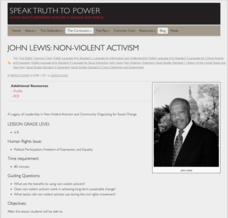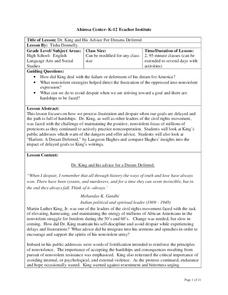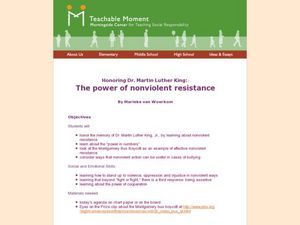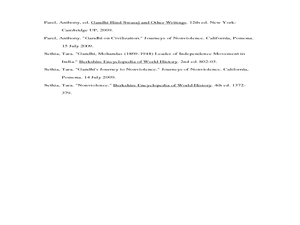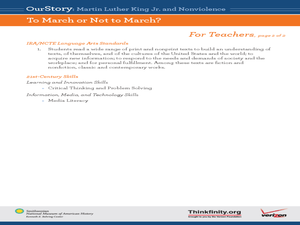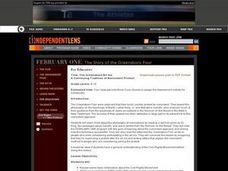National Endowment for the Humanities
Martin Luther King, Jr. and Nonviolent Resistance
Was nonviolent resistance the best means of securing civil rights for black Americans in the 1960s? In this highly engaging and informative lesson, your young historians will closely analyze several key documents from the civil rights...
C-SPAN
Last Days of Martin Luther King, Jr.
On April 4, 1968, Dr. Martin Luther King, Jr. was assassinated in Memphis, Tennessee. Four video clips reveal the events of that time, including the shift in the focus of the Civil Rights Movement, the aftermath of the assassination, and...
PBS
Martin Luther King Jr.: Civil Rights Leader
Expand class members' appreciation of the work of Dr. Martin Luther King, Jr. A powerful resource examines King's speeches, writings, and actions that reveal his deep commitment to a nonviolent approach to Civil Rights. Learners watch a...
Curated OER
Socratic Seminar on Martin Luther King, Jr.’s Letter From Birmingham Jail
Key in the struggle to gain the rights of democratic citizenship was the April 1963 arrest of Dr. Martin Luther King, Jr. for civil disobedience. To deepen their knowledge and understanding of events during the civil rights movement,...
Speak Truth to Power
John Lewis: Non-Violent Activism
After comparing and contrasting non-violent and violent social movements, your young historians will take a closer look at the work and influence of John Lewis on the civil rights movement. They will then choose a current social justice...
Curated OER
Martin Luther King and Malcom X on Violence and Integration
Dr. Martin Luther King and Malcolm X were contemporaries. Both were gifted orators, both were preachers, both were leaders during the Civil Rights era, both were assassinated. But the two had very different views on violence and...
PBS
Making Change: Revolutionary Tactics of the Civil Rights Movement
The film American Revolutionary: The Evolution of Grace Lee Boggs introduces viewers to the differing philosophies of and strategies employed by 1960s civil rights leaders such as Malcolm X and Martin Luther King, Jr. and the debate over...
Curated OER
Martin Luther King, Jr., and the Power of Nonviolence
Students examine the philosophy of nonviolence developed by Martin Luther King, Jr. and how this turned into practice during the Civil Rights Movement. They compare these teachings to those of Mohandas K. Ghandi.
Curated OER
The Way You Dream: Gandhi and King's Visions of Nonviolence
Learners read Gandhi and Dr. King's messages about nonviolence and discuss their visions about loving one's enemies. In this nonviolence lesson, students read Gandhi's "Ahimsa, or the Way of Nonviolence" and Dr. Martin Luther King's...
Curated OER
Martin Luther King Jr. and Nonviolence
Students explore a local seat of government to examine ways to make changes in their communities. In this local government activity, students read about Martin Luther King, Jr. and his nonviolent protests. Students read important dates...
Curated OER
Tracing the Idea of Civil Disobedience through Thoreau, Gandhi, and King
Students analyze civil disobedience through history studying Thoreau, Gandhi, and Dr. King. In this civil disobedience lesson, students read and analyze excerpts from Thoreau, Gandhi, and Martin Luther King. Students demonstrate their...
Curated OER
Dr. King and His Advice for Dreams Deferred
Students analyze Dr. King's public addresses and Langston Hughes' poetry as a study of the Civil Rights' nonviolent approach to making an impact. In this protesting lesson, students read poetry of Hughes and speeches by Dr. King as a...
Curated OER
The Power of Nonviolent Resistance
Young scholars discuss the power of nonviolent resistance in terms of Dr. Martin Luther King and the boycotts that he led. In this nonviolent resistance lesson plan, students discuss their thoughts of nonviolent resistance and how they...
Curated OER
Understanding the Theoretical Basis for Civil Disobedience
Students analyze Henry David Thoreau's 'On the Duty of Civil Disobedience' and Dr. Martin Luther King's "Letter from Birmingham Jail." In this civil disobedience lesson, students read Thoreau's essay and answer 6 questions for the...
Teaching for Change
A Documents-Based Lesson on the Voting Rights Act
How did the Voting Rights Act affect the daily lives of American citizens? A document-based lesson developed by the Student Non-Violent Coordinating committee (SNCC) presents a case study of the impact of the Voting Rights Act of 1965 on...
Curated OER
Nonviolence and Conflict: Its Importance to Building Community
Students study nonviolence and the values associated with nonviolence. In this social science lesson, students identify the six steps of nonviolence and the six principles of nonviolence as put forth by Martin Luther King, Jr. Students...
Described and Captioned Media Program
Malcolm X: Make It Plain, Part II
Track the transformation of Malcolm Little into Malcolm X and then into El Jajj Malik El-Shabazz with the second part of Make it Plain, a documentary on the famous civil rights activist. Viewers consider not only how events shaped and...
Curated OER
To March or Not to March?
Students read historical artifacts about the March on Washington for Jobs and Freedom and analyze the choices made during the time. In this March on Washington lesson, students read Martin's Big Words and the 'Step Back in Time' sheets....
Curated OER
Nonviolent Protest Around the World
Twelfth graders complete research that exposes them to examples of nonviolent protest throughout the modern world. For this nonviolent protest research lesson, 12th graders discover information about signification nonviolent movements...
PBS
March on Washington: A Time for Change
Young historians conclude their study of the events that lead up to and the planning for the March on Washington. After examining videos and primary source documents, they consider the civil rights objectives that still need to be...
Curated OER
The Greensboro Sit-Ins: A Continuing Tradition of Nonviolent Protest
Students watch a video about nonviolent protests during the Civil Rights Movement. They discuss and write about the Greensboro sit-ins while deciding the effectiveness of this type of protest.






